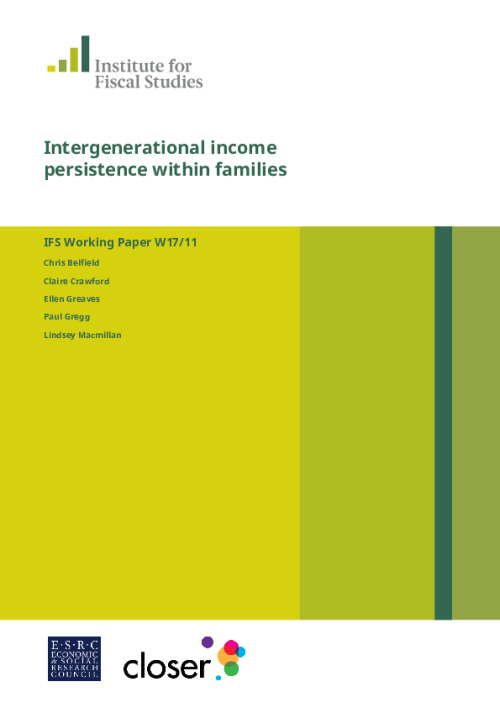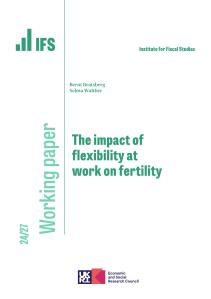Downloads

WP201711.pdf
PDF | 848.71 KB
There is substantial evidence of a significant relationship between parents’ income and sons’ earnings in the UK, and that this relationship has strengthened over time. We extend this by exploring a broader measure of net family income as an outcome. In doing so, we uncover three additional trends in social mobility. Partnership, and the level of earnings from any partner, are increasingly related to family background. The progressive direct tax and benefit system in the UK acts to offset intergenerational income persistence and has a stronger effect for the later cohort. Finally, men from higher-income backgrounds are significantly more likely than those from lower-income backgrounds to be in paid work and hence have higher incomes. Including out-of-work men in the analysis increases the estimates of
intergenerational income persistence.
Authors

Research Fellow University College London
Claire is a Research Fellow at IFS, working on the determinants and consequences of participation in childcare and education for parents and children.

Research Fellow University of Bristol
Ellen, who was a Senior Research Economist at IFS and is now a Research Fellow, is a Max Weber Fellow at the European University Institute.

Chris Belfield

Paul Gregg

Research Fellow University College London
Lindsey, an IFS Research Fellow, is a Professor of Economics and the Centre Head of Quantitative Social Science at UCL Institute of Education.
Working Paper details
- DOI
- 10.1920/wp.ifs.2017.W1711
- Publisher
- The IFS
Suggested citation
Belfield, C et al. (2017). Intergenerational income persistence within families. London: The IFS. Available at: https://ifs.org.uk/publications/intergenerational-income-persistence-within-families (accessed: 30 June 2024).
More from IFS
Understand this issue

Sure Start achieved its aims, then we threw it away
15 April 2024

Social mobility and wealth
12 December 2023

How important is the Bank of Mum and Dad?
15 December 2023
Policy analysis

Making mortgage guarantees permanent will help some first-time buyers, but only if they can afford a bigger mortgage
6 June 2024

How do the last five years measure up on levelling up?
19 June 2024

Conservatives' plan for child benefit withdrawal goes some way to fixing a bizarre system - but misses an opportunity for a more fundamental reshape
6 June 2024
Academic research

Income inequality in Ireland, 1987–2019
28 June 2024

Components of the evolution of income inequality in Sweden, 1990–2021
28 June 2024

The impact of flexibility at work on fertility
11 June 2024